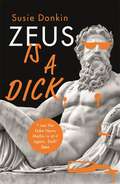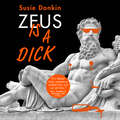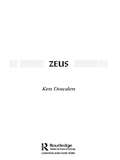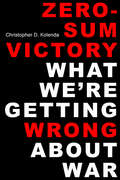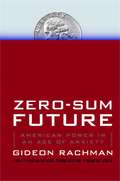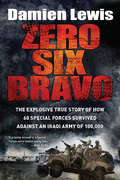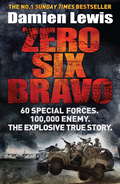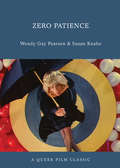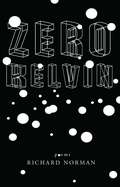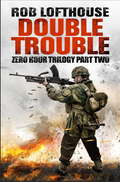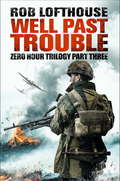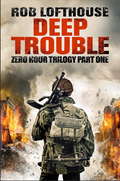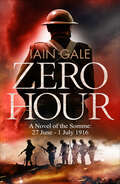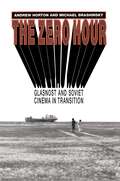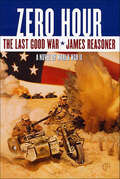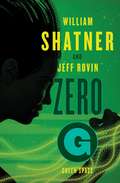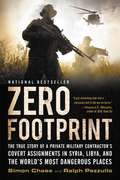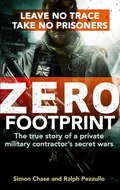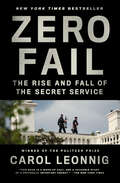- Table View
- List View
Zhang Hongtu: Expanding Visions of a Shrinking World
by Jerome Silbergeld Luchia Meihua LeeIn this book, leading art experts, art historians, and critics review the life, career, and artistic development of New York based Chinese artist Zhang Hongtu. A pioneer in contemporary Chinese art, Zhang created the first example of "China Pop" art, and his oeuvre is as diverse, intellectually complex, and engaging as it is entertaining. From painting and sculpture to computer generated works and multimedia projects, Zhang's art is equally rich in terms of China's history and its current events, containing profound reflections on China's oldest cultural habits and contemporary preoccupations. He provides a model of cross-cultural interaction designed to make Asian and Western audiences look more closely at each other and at themselves to recognize the beliefs they hold and the unexamined values they adhere to. From his early work in China during the Cultural Revolution to his decades as an artist in New York, Zhang reflects the complex attitudes of a scholar-artist toward modernity, as well as toward Asian and Western societies and himself. Placing Zhang in the context of his cultural milieu both in China and in the Chinese immigrant artist community in America, this volume's contributors examine his adaptations of classic art to reflect a contemporary sensibility, his relation to Cubism and Social Realism, his collaboration with the celebrated fashion designer Vivienne Tam, and his visual critique of China's current environmental crisis. Zhang's work will be on display at the Queens Museum in New York City from October 17, 2015 to March 6, 2016. Contributors: Julia F. Andrews, Alexandra Chang, Tom Finkelpearl, Michael Fitzgerald, Wu Hung, Luchia Meihua Lee, Morgan Perkins, Kui Yi Shen, Jerome Silbergeld, Eugenie Tsai, Thuy Linh Nguyen Tu, Lilly Wei Co-published by the Queens Museum and Duke University Press.
Zhang Heng and the Incredible Earthquake Detector
by Randel McGeeZhang Heng, a brilliant inventor and advisor to the emperor, must create a device that can determine where an earthquake took place. Told in the dying art of Chinese shadow puppetry, this true story of the first seismograph will entertain and educate.
Zeus Is A Dick
by Susie DonkinIn the beginning, everything was fine.* And then along came Zeus. *more or lessAhh Greek myths. Those glorious tales of heroism, honour and... petty squabbles, soap-opera drama and more weird sex than Fifty Shades of Grey could shake a stick at! It's about time we stopped respecting myths and started laughing at them. Did you know Aphrodite, goddess of love and beauty, was born of some discarded genitals? Or that Hera threw her own son off a mountain because he was ugly? Or that Apollo once kidnapped a boat full of people while pretending to be a dolphin? And let's not even get started on Zeus - king of the gods, ruler of the skies and a man who's never heard of self-control. In fact, if there's one thing most Greek myths have in common, it's that all the drama could have been avoided if SOMEONE could keep it in their toga...Horrible Histories writer Susie Donkin takes us on a hilarious romp through mythology and the many times the gods (literally) screwed everything up! Stephen Fry's Mythos by way of Drunk History, Zeus is a Dick is perfect for those who like their myths with a heavy dollop of satire.'Who knew mythology was so bonkers? I am grateful - it had me laughing from the first page to the last.' - Miranda Hart'It's about time someone called him out on all this' - Hera, goddess of marriage, wife of Zeus'Worst. Father. Ever.' - Artemis, goddess of the hunt, daughter of Zeus'Oh yeah, focus on him. I never did anything wrong. Nothing to see here' - Poseidon, god of the seas, brother of Zeus'Just a real dick, honestly' - Many, many people
Zeus Is A Dick
by Susie DonkinIn the beginning, everything was fine.* And then along came Zeus. *more or lessAhh Greek myths. Those glorious tales of heroism, honour and... petty squabbles, soap-opera drama and more weird sex than Fifty Shades of Grey could shake a stick at! It's about time we stopped respecting myths and started laughing at them. Did you know Aphrodite, goddess of love and beauty, was born of some discarded genitals? Or that Hera threw her own son off a mountain because he was ugly? Or that Apollo once kidnapped a boat full of people while pretending to be a dolphin? And let's not even get started on Zeus - king of the gods, ruler of the skies and a man who's never heard of self-control. In fact, if there's one thing most Greek myths have in common, it's that all the drama could have been avoided if SOMEONE could keep it in their toga...Horrible Histories writer Susie Donkin takes us on a hilarious romp through mythology and the many times the gods (literally) screwed everything up! Stephen Fry's Mythos by way of Drunk History, Zeus is a Dick is perfect for those who like their myths with a heavy dollop of satire.'Who knew mythology was so bonkers? I am grateful - it had me laughing from the first page to the last.' - Miranda Hart'It's about time someone called him out on all this' - Hera, goddess of marriage, wife of Zeus'Worst. Father. Ever.' - Artemis, goddess of the hunt, daughter of Zeus'Oh yeah, focus on him. I never did anything wrong. Nothing to see here' - Poseidon, god of the seas, brother of Zeus'Just a real dick, honestly' - Many, many people
Zeus Is A Dick
by Susie DonkinIn the beginning, everything was fine.* And then along came Zeus. *more or lessAhh Greek myths. Those glorious tales of heroism, honour and... petty squabbles, soap-opera drama and more weird sex than Fifty Shades of Grey could shake a stick at! It's about time we stopped respecting myths and started laughing at them - because they're really very weird. Did you know Aphrodite, goddess of love and beauty, was born of some discarded genitals? Or that Hera threw her own son off a mountain because he was ugly? Or that Apollo once kidnapped a boat full of people while pretending to be a dolphin? And let's not even get started on Zeus - king of the gods, ruler of the skies and a man who's never heard of self-control. In fact, if there's one thing most Greek myths have in common, it's that all the drama could have been avoided if SOMEONE could keep it in their toga...Horrible Histories writer Susie Donkin takes us on a hilarious romp through mythology and the many times the gods (literally) screwed everything up! Stephen Fry's Mythos by way of Drunk History, Zeus is a Dick is perfect for those who like their myths with a heavy dollop of satire."It's about time someone called him out on all this." - Hera, Goddess of Marriage, wife of Zeus"Worst. Father. Ever." - Artemis, Goddess of the Hunt, daughter of Zeus"Oh yeah, focus on him. I never did anything wrong. Nothing to see here." - Poseidon, God of the Seas, brother of Zeus"Just a real dick, honestly." - Many, many people(P) 2020 Hodder & Stoughton Ltd
Zeus (Gods and Heroes of the Ancient World)
by Ken DowdenThe first book to capture a complete picture of the most important of Greek gods in one reliable volume for almost seventy years, this masterly and comprehensive study brings a new-millennium examination of the fascinating god Zeus. Broad in scope, the book looks at myth, art, cult, philosophy, drama, theology and European painting amongst much more, and allows us to take seriously what it was to worship and respect the greatest of Greek gods, and to live through the aftershock of the Middle Ages and modern times. Showing the evidence along the way, Zeus is student-friendly and includes: a range of illustrations and maps translated passages from ancient authors a chronology and excellent indexing. Looking at the ancient Greeks their predecessor and their successors – the Romans and beyond – the book is engagingly written and speaks to a modern audience: this is Zeus from our remote ancestors to Wagner, and into the computer age.
Zero-Sustainment Aircraft for the U.S. Air Force
by National Research CouncilOverall Air Force weapon system sustainment (WSS) costs are growing at more than 4 percent per year, while budgets have remained essentially flat. The cost growth is due partly to aging of the aircraft fleet, and partly to the cost of supporting higher-performance aircraft and new capabilities provided by more complex and sophisticated systems, such as the latest intelligence, surveillance, and reconnaissance (ISR) platforms. Furthermore, the expectation for the foreseeable future is that sustainment budgets are likely to decrease, so that the gap between budgets and sustainment needs will likely continue to grow wider. Most observers accept that the Air Force will have to adopt new approaches to WSS if it is going to address this problem and remain capable of carrying out its missions. In this context, the original intent of this 3-day workshop was to focus on ways that science and technology (S&T) could help the Air Force reduce sustainment costs. However, as the workshop evolved, the discussions focused more and more on Air Force leadership, management authority, and culture as the more critical factors that need to change in order to solve sustainment problems. Many participants felt that while S&T investments could certainly help--particularly if applied in the early stages ("to the left") of the product life cycle--adopting a transformational management approach that defines the user-driven goals of the enterprise, empowers people to achieve them, and holds them accountable, down to the shop level. Several workshop participants urged Air Force leaders to start the process now, even though it will take years to percolate down through the entire organization. These sustainment concerns are not new and have been studied extensively, including recent reports from the National Research Council's Air Force Studies Board and the Air Force Scientific Advisory Board.
Zero-Sum Victory: What We're Getting Wrong About War
by Christopher D. KolendaThe military expert and author of Leadership presents &“the most thoughtful analysis yet of America&’s recent conflicts—and future challenges&” (Gen. Stanley A. McChrystal). Why have the major post-9/11 US military interventions turned into quagmires? Despite huge power imbalances in America&’s favor, capacity-building efforts, and tactical victories, the wars in Afghanistan and Iraq turned intractable. The US government&’s fixation on zero-sum, decisive victory in these conflicts is a key reason why these operations failed to achieve favorable and durable outcomes. In Zero-Sum Victory, retired US Army colonel Christopher D. Kolenda identifies three interrelated problems that have emerged from the government&’s insistence on zero-sum victory. First, the US government has no way to measure successful outcomes other than a decisive military victory, and thus, selects strategies that overestimate the possibility of such an outcome. Second, the United States is slow to recognize, modify, or abandon losing strategies. Third, once the United States decides to withdraw, bargaining asymmetries and disconnects in strategy undermine the prospects for a successful transition or negotiated outcome. Relying on historic examples and personal experience, Kolenda draws thought-provoking and actionable conclusions about the utility of American military power in the contemporary world—insights that serve as a starting point for future scholarship as well as for important national security reforms.
Zero-Sum Future
by Gideon RachmanFrom one of the world's most influential commentators on international affairs, chief foreign affairs columnist for the Financial Times, comes a stark warning about a gathering global political crisis. Successive presidents have welcomed globalization and the rise of China. But with American unemployment stubbornly high and U.S. power facing new challenges, the stage is set for growing rivalry between America and China. The European Union is also ripping itself apart. The win-win logic of globalization is giving way to a zero-sum logic of political and economic struggle. The new world we now live in, an age of anxiety, is a less prosperous, less stable world, with old ideas overthrown and new ideologies and powers on the rise. Rachman shows how zero-sum logic is thwarting efforts to deal with global problems from Afghanistan to unemployment, climate change to nuclear proliferation. This timely and important book details why international politics is now more dangerous and volatile--and suggests what can be done to break away from the crippling logic of a zero-sum world.
Zero Six Bravo
by Damien LewisDamien Lewis has spent twenty years reporting from conflict zones around the world. Zero Six Bravo--a Sunday Times number one bestseller--tells the story of "sixty special forces against 100,000--a feat of arms to take the breath away." (Frederick Forsythe) They were branded as cowards and accused desertion. But nothing could be further from the truth. Ten years on, the story of these sixty men can finally be told. In March 2003, M Squadron--an SBS unit with SAS embeds--was sent 1,000 kilometers behind enemy lines on a true mission impossible, to take the surrender of the 100,000-strong Iraqi Army 5th Corps, an operation so risky it earned the nickname â??Operation No Return' right out of the gate. Caught in a ferocious ambush by Saddam Hussein's Fedayeen, plus the awesome firepower of the 5th Corps' heavy armor, and with eight of their vehicles bogged in Iraqi swamps, M Squadron launched a desperate bid to escape, inflicting massive damage on their enemies. Running low on fuel and ammunition, outnumbered, and outgunned, the elite operators destroyed sensitive information and prepared for death or capture as the Iraqis closed their deadly trap. Zero Six Bravo contains previously unpublished information detailing the essential involvement of American troops in this astonishing military feat. Zero Six Bravo recounts in vivid and compelling detail the most desperate battle fought by British and allied Special Forces trapped behind enemy lines since World War Two.
Zero Six Bravo: 60 Special Forces. 100,000 Enemy. The Explosive True Story
by Damien LewisThe Sunday Times No.1 bestseller. They were branded as cowards and accused of being the British Special Forces Squadron that ran away from the Iraqis. But nothing could be further from the truth. Ten years on, the story of these sixty men can finally be told. In March 2003 M Squadron - an SBS unit with SAS embeds - was sent 1,000 kilometres behind enemy lines on a true mission impossible, to take the surrender of the 100,000-strong Iraqi Army 5th Corps. From the very start their tasking earned the nickname 'Operation No Return'. Caught in a ferocious ambush by thousands of die-hard fanatics from Saddam Hussein's Fedayeen, plus the awesome firepower of the 5th Corps' heavy armour, and with eight of their vehicles bogged in Iraqi swamps, M Squadron launched a desperate bid to escape, inflicting massive damage on their enemies. Running low on fuel and ammunition, outnumbered, outmanoeuvred and outgunned, the elite operators destroyed sensitive kit and prepared for death or capture as the Iraqis closed their deadly trap. Zero Six Bravo recounts in vivid and compelling detail the most desperate battle fought by British and allied Special Forces trapped behind enemy lines since World War Two. It is a classic account of elite soldiering that ranks with Bravo Two Zero and the very greatest Special Forces missions of our time.
Zero Six Bravo: 60 Special Forces. 100,000 Enemy. The Explosive True Story
by Damien LewisThe Sunday Times No.1 bestseller.They were branded as cowards and accused of being the British Special Forces Squadron that ran away from the Iraqis. But nothing could be further from the truth. Ten years on, the story of these sixty men can finally be told. In March 2003 M Squadron - an SBS unit with SAS embeds - was sent 1,000 kilometres behind enemy lines on a true mission impossible, to take the surrender of the 100,000-strong Iraqi Army 5th Corps. From the very start their tasking earned the nickname 'Operation No Return'. Caught in a ferocious ambush by thousands of die-hard fanatics from Saddam Hussein's Fedayeen, plus the awesome firepower of the 5th Corps' heavy armour, and with eight of their vehicles bogged in Iraqi swamps, M Squadron launched a desperate bid to escape, inflicting massive damage on their enemies. Running low on fuel and ammunition, outnumbered, outmanoeuvred and outgunned, the elite operators destroyed sensitive kit and prepared for death or capture as the Iraqis closed their deadly trap. Zero Six Bravo recounts in vivid and compelling detail the most desperate battle fought by British and allied Special Forces trapped behind enemy lines since World War Two. It is a classic account of elite soldiering that ranks with Bravo Two Zero and the very greatest Special Forces missions of our time.
Zero Patience: A Queer Film Classic
by Susan Knabe Wendy Gay PearsonA Queer Film Classic on John Greyson's controversial 1993 film musical about the AIDS crisis which combines experimental, camp musical, and documentary aesthetics while refuting the legend of Patient Zero, the male flight attendant accused in Randy Shilts' book And the Band Played On of bringing the AIDS crisis to North America. Wendy Gay Pearson and Susan Knabe both teach in the women's studies and Feminist Research department at the University of Western Ontario. Arsenal's Queer Film Classics series cover some of the most important and influential films about and by LGBTQ people.
Zero Kelvin
by Richard NormanPresent-day astronomy, vast, complex, is looking through darkness to distant objects and times. Yet its discoveries aren't exclusively scientific: from the moons of Pluto to the Doppler effect, the night sky screens a place where math meets myth. Now, in Zero Kelvin, in scenes that shift from the mountains of Goma to the mountains of the moon, from galaxies that feast upon their neighbours to a solar sail unfurling above Earth's orbit, Richard Norman's poetry probes both newly glimpsed corners of the universe, and the myths which bring them into focus. Experiment. It is a human urge-to orbit backwards at great speed.Experimentally, you do itand then the crack of lightning, the open-ended snowflake, splits the sky. Just as the sculptor cut the fat off space,you going backwards renders time. Seconds drop like filings when a magnet is turned off.
Zero Hour Trilogy: (2) (Zero Hour Trilogy)
by Rob LofthouseDouble Trouble is the sensational, breathless sequel to Deep Trouble and tells the story of one of the most famous operations of the Second World War: 50,000 airborne troops, nine days of fierce fighting, one bridge too far.September, 1944 - Just three months after D-Day and the Allied invasion is getting bogged down in France. The commanders need a change of tactics. Cue Operation Market Garden - the largest and most audacious airborne raid of the war. Fresh from D-Day, Robbie Stokes finds himself drafted into an airborne division and landing in occupied Netherlands. Greeted by a hail of German flak and bullets it quickly becomes clear that the operation is not the surprise it should be. Battle-hardened in Normandy, Robbie finds himself forced to take a leading role as he and his platoon try and break through to Arnhem Bridge.
Zero Hour Trilogy: (3) (Zero Hour Trilogy)
by Rob LofthouseWell Past Trouble is the last in the Zero Hour trilogy and sees Robbie and his men's endurance, spirit and bond tested to their limits.March, 1945 - With the Germans in retreat, the Allies begin to look toward the ultimate prize: Berlin. But first they must cross the heavily-defended Rhine into Germany's industrial heartland. In the savage fighting for this crucial gateway, Robbie Stokes and his airborne division must drop into enemy territory and hold off German reinforcements.Exhausted after fighting through France and the Netherlands it falls to Robbie to lift his company for one final operation and the push into Germany. But despite his experience, nothing he's seen yet can prepare him for what they find as the Germans retreat and their cruelty is revealed. The end is insight, but Robbie and his men will have to fight every inch of the way.
Zero Hour Trilogy: (1) (Zero Hour Trilogy)
by Rob LofthouseWritten by a retired British soldier, Deep Trouble is the first in a trilogy of novels telling the breathless, vivid story of one young recruit's experience of one of the greatest military invasions ever launched.6 June 1944 - Somewhere over the Normandy coastline, Robbie Stokes sits in a glider, his Bren resting on the floor between his outstretched legs. The nose lowers and the glider descends rapidly: ten minutes of stomach-churning twists and turns until suddenly the call goes up to 'BRACE'. The belly makes contact with the ground and the first Allied troops tumble out into occupied Europe.For Robbie Stokes it is the beginning of 72 hours of brutal and relentless conflict: a test of character, a test of nerve, a test of comradeship, of the band of brothers around him. If they fail, then the Allied invasion fails. They must succeed on their longest day.The operation to Pegasus Bridge is one of the most famous of the Second World War. Taking place six hours before the famous Normandy landings, when six gliders deposited the 2nd Battalion, Oxford and Bucks Light Infantry behind enemy lines with the orders to take and hold the bridges at Bénouville and Ranville.Part of this work has been previously published under the title, Well Past Trouble.
Zero Hour: A Novel of the Somme
by Iain GaleThe unforgettable story behind the most destructive day in British military history...June, 1916: The Great War is locked in stalemate, deep lines of trenches and barbed wire carved into the French countryside. Sitting in an occupied chateau, General von Soden knows that something cataclysmic is coming. The British have been shelling for days and he is badly under-resourced and outnumbered. A frontal assault is surely imminent, but he has spent two years building an extraordinary series of defences for just that day... Amidst the bombardment the British troops are preparing for the attack. Geoffrey Malins, with his cinematograph, Noel Hodgson writing poetry in his hut, Siegfried Sassoon observing the enemy, Sir Douglas Haig at HQ, waiting for the chance of glory... As the battle lines muster, the full ferocity of war will be unleashed. For those on the Front, as for those in the wider world, nothing will ever be the same again. Based on true stories, cinematic in scope and built around a huge cast, this is a blistering, unforgettable novel that brings home the brutality of war, perfect for fans of Rory Clements, Ben Macintyre and Robert Harris.
The Zero Hour: Glasnost and Soviet Cinema in Transition
by Andrew Horton Michael BrashinskyNow faced with the "zero hour" created by a new freedom of expression and the dramatic breakup of the Soviet Union, Soviet cinema has recently become one of the most interesting in the world, aesthetically as well as politically. How have Soviet filmmakers responded to the challenges of glasnost? To answer this question, the American film scholar Andrew Horton and the Soviet critic Michael Brashinsky offer the first book-length study of the rapid changes in Soviet cinema that have been taking place since 1985. What emerges from their collaborative dialogue is not only a valuable work of film criticism but also a fascinating study of contemporary Soviet culture in general. Horton and Brashinsky examine a wide variety of films from BOMZH (initials standing for homeless drifter) through Taxi Blues and the glasnost blockbuster Little Vera to the Latvian documentary Is It Easy to Be Young? and the "new wave" productions of the "Wild Kazakh boys." The authors argue that the medium that once served the Party became a major catalyst for the deconstruction of socialism, especially through documentary filmmaking. Special attention is paid to how filmmakers from 1985 through 1990 represent the newly "discovered" past of the pre-glasnost era and how they depict troubled youth and conflicts over the role of women in society. The book also emphasizes the evolving uses of comedy and satire and the incorporation of "genre film" techniques into a new popular cinema. An intriguing discussion of films of Georgia, Estonia, Latvia, Lithuania, and Kazakhstan ends the work.
Zero Hour: The Last Good War (Last Good War Ser. #3)
by James ReasonerNovember, 1942. In the Pacific with the U.S. Marines on Guadalcanal, and in North Africa with the British Armored Tank Command, James Reasoner puts readers into the thick of the most deadly action of World War II. The British Tank Command has been fighting an uphill battle with Rommel's Panzers. Brothers Joe and Dale Parker, detailed from the U.S. Army to help the British tankers, find themselves helping to turn the tide against the Desert Fox. Meanwhile, their friend Adam Bergman is in the Solomon Islands with the marines, as the U.S. starts the bloody fight to reclaim the Pacific. Reasoner takes us into the heart of the fight in both theaters of war, and to wartime struggles on the home front, and in hospitals on ships and in temporary quarters near the fronts. The immediacy of his prose and the urgency of his story convey a passion and conviction that will stir the blood of anyone who cares about freedom and wants to understand its price.At the Publisher's request, this title is being sold without Digital Rights Management Software (DRM) applied.
Zero-G: Green Space (The Samuel Lord Series #2)
by William Shatner Jeff RovinIn the second installment of William Shatner’s Zero-G series, Director Samuel Lord must identify a mole sabotaging the top-secret NASA project aboard the US space station Empyrean, while also fighting a fast-replicating virus that threatens humanity.In the year 2050, the United States sends the FBI to govern its space station, The Empyrean. Under the command of suave, eighty-year-old director Samuel Lord, the “Zero-G” men are in charge of investigating terrorism, crime, corruption, and espionage, keeping an eye on the rival Chinese and Russian stations as well. Lord and his team are assisting NASA in conducting a top-secret project in the agricultural center of the Empyrean. Using microscopic robots called nanites, they plan to construct a vine that can survive in space. The vine will grow structural material for an elevator that will reach from the Empyrean to Earth. Unfortunately, a Russian spy inadvertently causes the growth to rage out of control, not only threatening the Empyrean, but the Russian space station Red Giant. Under the guidance of Director Samuel Lord, Zero-G must not only identify the spy, but help find a way to stop the fast-replicating vine…and a form of “space zombie” birthed by the nanites. The surprising solution takes Lord and a Russian pilot on a dangerous mission to Venus—where a shocking discovery awaits.
Zero Footprint: The True Story of a Private Military Contractor¿s Covert Assignments in Syria, Libya, And the World¿s Most Dangerous Places
by Ralph Pezzullo Simon ChaseA dramatic insider account of the world of private military contracting.Armored cars, burner phones, top-notch weaponry and top-secret missions--this is the life of today's private military contractor. Like author Simon Chase, many PMCs were once the world's top military operatives, and since retiring from outfits like US Navy SEAL TEAM Six and the UK's Special Boat Service, they have devoted their lives to executing sensitive and hazardous missions overseas.Working at the request of U.S. and British government entities as well as for private clients, he takes on jobs that require "zero footprint," with no trace of their actions left behind.Chase delivers first-hand accounts of tracking Bin Laden in Afghanistan and being one of the first responders after the attack on the U.S. Consulate in Benghazi. We see his teams defuse terrorist bombs, guard dignitaries, and protect convoys traveling through perilous territory--and then there are the really big jobs: top-secret "zero footprint" missions that include searching for High Value Targets and setting up arms shipping networks.The missions in Zero Footprint will shock readers, but so will the personal dangers. Chase and the men he works with operate without government backup or air rescue. If they die serving their country--they remain anonymous. There are no military honors or benefits. Contractors like Simon Chase are the unsung heroes in the war against terrorism, a strong, but largely invisible force--until now.
Zero Fail: The Rise and Fall of the Secret Service
by Carol LeonnigThe first definitive account of the rise and fall of the Secret Service, from the Kennedy assassination to the alarming mismanagement of the Obama and Trump years, right up to the insurrection at the Capitol on January 6—by the Pulitzer Prize winner and #1 New York Times bestselling co-author of A Very Stable Genius Carol Leonnig has been reporting on the Secret Service for The Washington Post for most of the last decade, bringing to light the secrets, scandals, and shortcomings that plague the agency today—from a toxic work culture to dangerously outdated equipment to the deep resentment within the ranks at key agency leaders, who put protecting the agency’s once-hallowed image before fixing its flaws. But the Secret Service wasn’t always so troubled. <p><p> The Secret Service was born in 1865, in the wake of the assassination of Abraham Lincoln, but its story begins in earnest in 1963, with the death of John F. Kennedy. Shocked into reform by its failure to protect the president on that fateful day in Dallas, this once-sleepy agency was radically transformed into an elite, highly trained unit that would redeem itself several times, most famously in 1981 by thwarting an assassination attempt against Ronald Reagan. But this reputation for courage and excellence would not last forever. By Barack Obama’s presidency, the once-proud Secret Service was running on fumes and beset by mistakes and alarming lapses in judgment: break-ins at the White House, an armed gunman firing into the windows of the residence while confused agents stood by, and a massive prostitution scandal among agents in Cartagena, to name just a few. With Donald Trump’s arrival, a series of promised reforms were cast aside, as a president disdainful of public service instead abused the Secret Service to rack up political and personal gains. <p><p> To explore these problems in the ranks, Leonnig interviewed dozens of current and former agents, government officials, and whistleblowers who put their jobs on the line to speak out about a hobbled agency that’s in desperate need of reform. “I will be forever grateful to them for risking their careers,” she writes, “not because they wanted to share tantalizing gossip about presidents and their families, but because they know that the Service is broken and needs fixing. By telling their story, they hope to revive the Service they love.”
Zero Degrees: Geographies of the Prime Meridian
by Charles W. WithersCharles Withers explains how the choice of Greenwich to mark 0° longitude solved problems of global measurement that had engaged geographers, astronomers, and mariners since ancient times. This history is a testament to the power of maps, the challenges of global measurement, and the role of scientific authority in creating the modern world.


